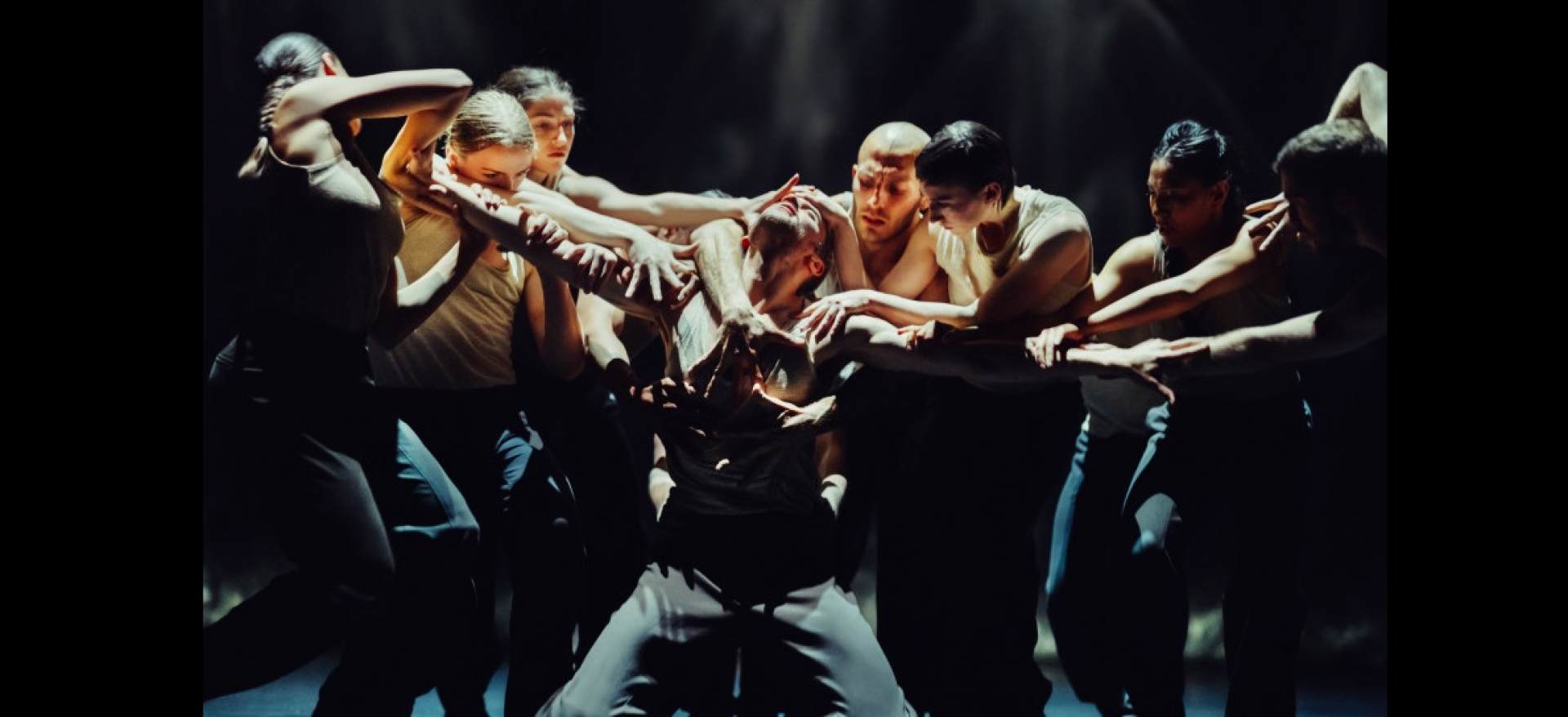Nederlands Dans Theater & Complicité
Mo | Tu | We | Th | Fr | Sa | Su |
Nederlands Dans Theater & Complicité
Figures in Extinction [1.0] / Figures in Extinction [2.0] – But then you come to the humans / Figures in Extinction [3.0]
A project by Crystal Pite and Simon McBurney
The Nederlands Dans Theater (NDT) is making a guest appearance at the Staatsballett Berlin with an extraordinary project: Figures in Extinction, a trilogy about climate change that choreographer Crystal Pite and director Simon McBurney are developping over several years at the NDT.
«We are living in an age of extinction. Can we ever hope to give a name to what we are losing? What does it mean to bear witness to a violence in which we are both perpetrators and victims?» Across continents, these world-renowned artists have exchanged ideas reflecting on their fears and cautious hopes for the age we are living in, and how artists can meaningfully create in the face of mass destruction. Now NDT and McBurney’s company Complicité present a major new collaboration that has seen these artists work together over four years to create three new works for NDT 1, each developed in response to the last. The first work, Figures in Exctintion [1.0] premiered in The Hague in 2022 and was awarded the «Zwaan» (Swan) for the most impressive dance production in 2022. The second work, premiered in February 2024, is a searing examination of our need for connection in a separated world. In Figures in Extinction [2.0] - But then you come to the humans, a complex scientific text sounds from off-screen, warning us not to neglect our empathic right brain in favour of the data-processing left. The third and final piece will continue this cross-disciplinary exchange, premiering in the UK in February 2025, and offering a spark in the darkness as to where we might go.
Founded in 1959, Nederlands Dans Theater (NDT) is a leading international contemporary dance company dedicated to the research and creation of new work. Complicité is an international touring theatre company based in London led by Artistic Director and co-founder, Simon McBurney. Complicité creates work that strengthens human interconnection, using the complicity between performer and audience that is at the heart of the theatrical experience. Complicité works across art forms, believing theatre, opera, film, radio, installation, publication and participatory arts can all be sites for the collective act of imagination.
Program and cast
A co-production of Nederlands Dans Theater and Complicité. An evening commissioned by Factory International. Co-produced by Parkstad Limburg Theatres Heerlen & Montpellier Danse
Featuring dancers of the Nederlands Dans Theater
Deutsche Oper Berlin
The Deutsche Oper Berlin is an opera company located in the Charlottenburg district of Berlin, Germany. The resident building is the country's second largest opera house and also home to the Berlin State Ballet.
The company's history goes back to the Deutsches Opernhaus built by the then independent city of Charlottenburg—the "richest town of Prussia"—according to plans designed by Heinrich Seeling from 1911. It opened on November 7, 1912 with a performance of Beethoven's Fidelio, conducted by Ignatz Waghalter. After the incorporation of Charlottenburg by the 1920 Greater Berlin Act, the name of the resident building was changed to Städtische Oper (Municipal Opera) in 1925.
Deutsches Opernhaus, 1912
With the Nazi Machtergreifung in 1933, the opera was under control of the Reich Ministry of Public Enlightenment and Propaganda. Minister Joseph Goebbels had the name changed back to Deutsches Opernhaus, competing with the Berlin State Opera in Mitte controlled by his rival, the Prussian minister-president Hermann Göring. In 1935, the building was remodeled by Paul Baumgarten and the seating reduced from 2300 to 2098. Carl Ebert, the pre-World War II general manager, chose to emigrate from Germany rather than endorse the Nazi view of music, and went on to co-found the Glyndebourne opera festival in England. He was replaced by Max von Schillings, who acceded to enact works of "unalloyed German character". Several artists, like the conductor Fritz Stiedry or the singer Alexander Kipnis followed Ebert into emigration. The opera house was destroyed by a RAF air raid on 23 November 1943. Performances continued at the Admiralspalast in Mitte until 1945. Ebert returned as general manager after the war.
After the war, the company in what was now West Berlin used the nearby building of the Theater des Westens until the opera house was rebuilt. The sober design by Fritz Bornemann was completed on 24 September 1961. The opening production was Mozart's Don Giovanni. The new building opened with the current name.

 EN
EN DE
DE IT
IT FR
FR ES
ES RU
RU JP
JP RO
RO
 Seating plan
Seating plan 